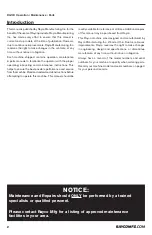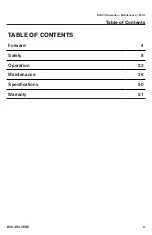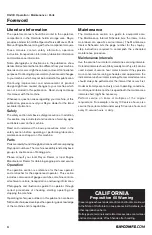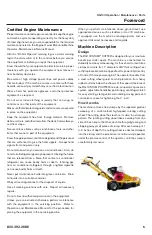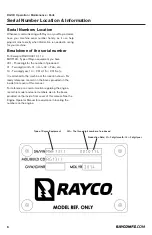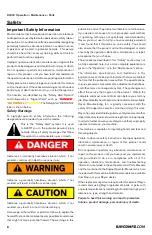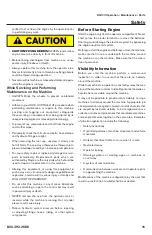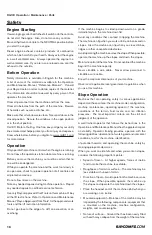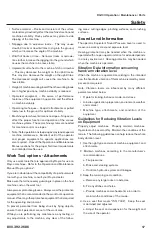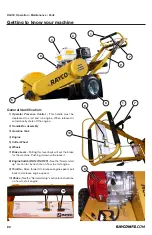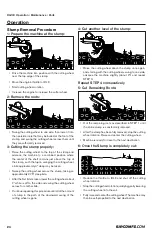
RG13II Operation • Maintenance • Parts
12
Safety
Burn Prevention
Do not touch any part of an operating engine. Allow the
engine, radiator, exhaust and hydraulic reservoir to cool before
any maintenance is performed. Relieve all pressure in the
air system, oil system, lubrication system, fuel system, and/
or in the cooling system before any lines, fittings or related
items are disconnected.
In addition, avoid contact with other related hot engine parts
such as exhaust manifolds, turbochargers and mufflers.
External exhaust parts become very hot during operation.
Paper, cloth, and wooden materials could ignite if they come
in contact with these parts.
Coolant
When the engine is at operating temperature, the engine
coolant is hot. The coolant is also under pressure. The
radiator and all lines to the heaters or to the engine contain
hot coolant.
Any contact with hot coolant or with steam can cause severe
burns. Allow cooling system components to cool before the
cooling system is drained.
Check the coolant level only after the engine has been stopped.
Ensure that the filler cap is cool before removing the filler
cap. The filler cap must be cool enough to touch with a bare
hand. Remove the filler cap slowly in order to relieve pressure.
Cooling system conditioner contains alkali. Alkali can cause
personal injury. Do not allow alkali to contact the skin, the
eyes or the mouth.
Oils
Hot oil and hot components can cause personal injury. Do
not allow hot oil to contact the skin. Also, do not allow hot
components to contact the skin.
Remove the hydraulic tank filler cap only after the engine
has been stopped. The filler cap must be cool enough to
touch with a bare hand. Follow the standard procedure in
this manual in order to remove the hydraulic tank filler cap.
Batteries
Electrolyte is an acid. Electrolyte can cause personal injury.
Do not allow electrolyte to contact the skin or the eyes.
Always wear protective glasses for servicing batteries. Wash
hands after touching the batteries and connectors. Use of
gloves is recommended.
Tires
Tire explosion can result if the following procedures are
not followed:
• Check for and maintain correct tire pressure.
• Do not inflate the tires above the recommended pressure.
• Replace any wheel with cuts, bubbles, or damaged rims.
• Do not weld or heat the wheel assembly. Heating will
increase tire pressure.


